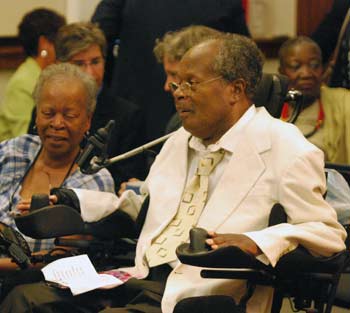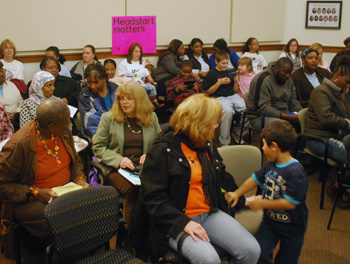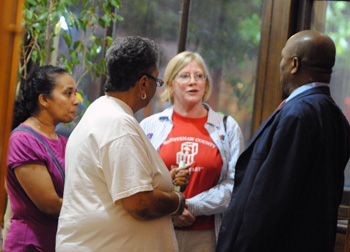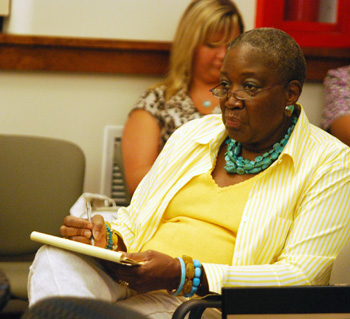County Board Debates Infrastructure Issues
Washtenaw County board of commissioners meeting (Sept. 4, 2013): A five-hour meeting was dominated by two debates: funding for a new software system for the Washtenaw County trial court, and the future of county-owned property on Platt Road.

Charles Beatty Jr. attended the Sept. 4 Washtenaw County board of commissioners meeting to accept a resolution in honor of his father, Charles Beatty Sr. The board supports naming the Head Start building at 1661 LeForge in Ypsilanti – owned by the county – in honor of the late Charles Beatty Sr., who was influential in early childhood education. (Photos by the writer.)
For the site at 2260 and 2270 Platt Road – the former juvenile center – staff have proposed a process that focuses on possibly using the site for affordable housing. A $100,000 planning grant is available to explore that option. However, several commissioners – while expressing support for affordable housing in general – wanted to look at a broader range of alternatives, including the possibility of selling the site, which some believe could be worth $2 million. After more than an hour of debate, the board voted to postpone action until its Sept. 18 meeting, directing staff to prepare an alternative resolution to consider.
Another lengthy debate focused on the funding mechanism for new trial court software, estimated to cost $2.3 million. The vendor of the current system went out of business several years ago, and replacement is critical. Donald Shelton, chief judge of the trial court, told commissioners: “If this [software] system goes down, our judicial system in the county simply stops operating.”
Some commissioners wanted a more formal mechanism to repay the county’s investment in the system, which includes nearly $1.3 million from capital reserves. The board eventually passed a resolution stating that revenues from the court’s electronic filing fees will be used to reimburse the capital reserves. E-filing fees – likely to be $6 per filing – are expected initially to generate only about $45,000 in revenues. The e-filing will start with civil cases, with phased roll-out to other cases, including criminal and probate. At some point, e-filing might become mandatory.
A range of other significant action items yielded far less discussion. The board gave initial approval to a new micro loan program for small businesses, to be managed by the Center for Empowerment and Economic Development. Also getting initial approval was a range of grants administered by the county’s office of community & economic development, as well as a resolution that would give blanket approval in the future to nearly 30 annual entitlement grants received by the county totaling an estimated $8.8 million, beginning in 2014. Currently, each of those grants requires separate annual approval by the board.
Commissioners also gave initial approval to strengthen the county’s affirmative action plan, as well as other nondiscrimination in employment-related policies. The primary change adds a prohibition of discrimination on the basis of gender identity, gender expression, and sexual orientation. Community activist Jim Toy and Jason Morgan, who serves on the board of the Jim Toy Community Center, spoke during public commentary to support the changes.
Other items receiving an initial vote from the board include: (1) adding three new full-time jobs for stewardship of the county nature preserves; (2) adding a new 10-bed treatment program for female teens in the county’s youth center that will create a net increase of 5.46 jobs; and (3) budgets for the county’s public health and community support & treatment service (CSTS) departments.
During the meeting, the board also honored the nonprofit Dawn Farm on its 40th anniversary, and recognized Bill McFarlane, the long-time Superior Township supervisor who recently announced his resignation due to health issues. Commissioners also supported renaming the county-owned Head Start building in Ypsilanti in honor of the late Charles Beatty Sr., a pioneer in early childhood education.
Topics that emerged during public commentary included a plea to urge state legislators to repeal Michigan’s version of a “stand your ground” law. Board chair Yousef Rabhi indicated his intent to bring forward such a resolution on Sept. 18 – similar to one passed by the Ann Arbor city council on Aug. 8, 2013. Rabhi also plans to introduce a resolution on Sept. 18 advocating for stronger cleanup standards of 1,4 dioxane – the contaminant in an underground plume caused by Pall-Gelman’s Scio Township operations. The Ann Arbor city council passed a resolution on Sept. 3, 2013 related to this issue.
Also on Sept. 18, a public hearing will be held to get input on a proposed increase to the Washtenaw County tax that supports services for indigent veterans and their families. The current rate is 0.0286 mills – or 1/35th of a mill. The new proposed rate of 1/30th of a mill would be levied in December 2013 to fund services in 2014. It’s expected to generate $463,160 in revenues. The public hearing was scheduled by commissioners at their Sept. 4 meeting. [Full Story]






